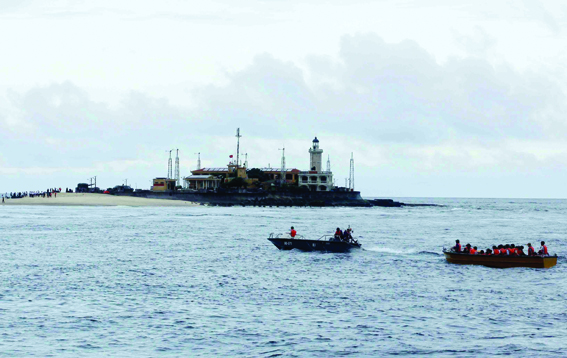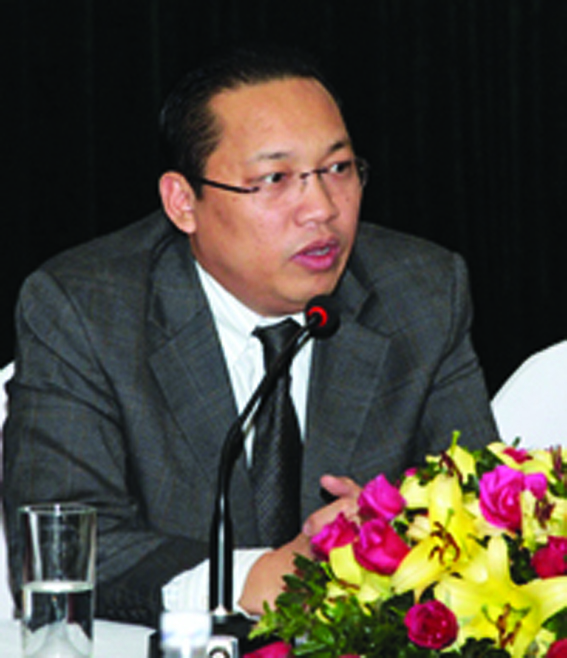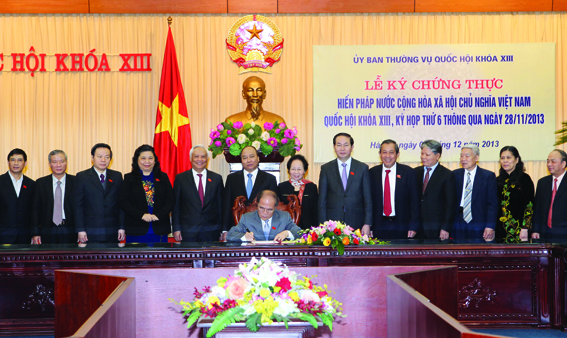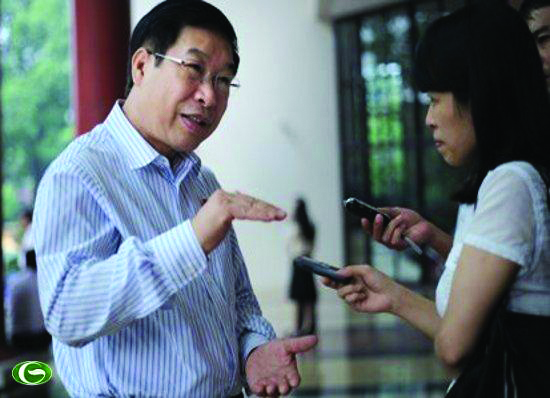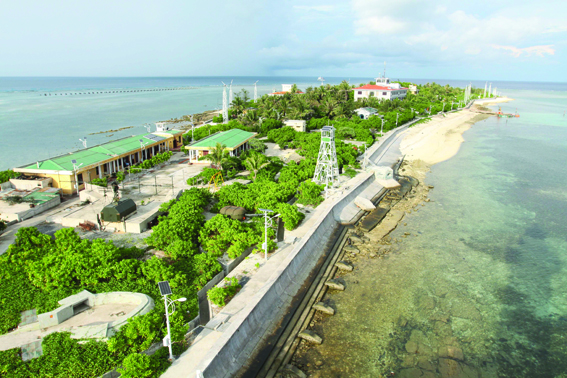Assoc. Prof. LL.D.’ Nguyen Quang Tuyen[1], and Do Viet Cuong, LL.M.[2]
The new Land Law was passed by the Vietnamese National Assembly on November last year and will take effect on July 1, 2014 (the 2013 Land Law). This Law, replacing the Land Law of 2003, contains numerous new provisions in order to meet the requirements of stepping up the comprehensive renewal process aiming to make Vietnam basically a modernity-oriented industrial nation by 2020. Many of these new provisions are related to the rights of foreign organizations and individuals, overseas Vietnamese and foreign-invested enterprises using land in Vietnam.
New provisions on general rights of land users (including foreigners)
The 2013 Land Law inherits the design of the 2003 version in classifying the provisions on the rights of land users into two groups: provisions on general rights of land users and provisions on specific rights of each land user.
General rights of land users are prescribed in Section 1 (Articles 166 thru 172), Chapter XI of the 2013 Land Law. All land users, both local and foreign, are entitled to these rights. Below are major new provisions on these rights.
First, the 2013 Land Law prescribes for the first time the rights of groups of land users (including foreigners) sharing land use rights (LURs). These rights include: (i) a group of land users being households and individuals have the same rights and obligations as households and individuals; in case a group of land users consists of a member being an economic entity, it will have the rights and obligations as those of economic entities; (ii) if such group of land users share LURs which can be split into portions for each member in the group, if every member wants to exercise his/her LURs over such portion, they shall carry out the prescribed procedures to have the common land parcel split into smaller parcels of their own and apply for certificates of LURs and ownership of houses and other land-attached assets. Those members will then have the rights and obligations of land users. In case LURs of a group of land users can not be split into portions, the group may authorize its representative to exercise the rights and perform the obligations of the group.
Second, the 2003 Land Law makes new provisions on the notarization and certification of contracts and documents on the exercise of the rights of land users. Specifically, contracts on transfer, donation, mortgage or contribution of LURs as capital or the rights to use land and land-attached assets must be notarized. Contracts on lease or sublease of LURs or the rights to use land and land-attached assets, contracts on exchange of agricultural LURs, contracts on transfer of LURs or the rights to use land and land-attached assets in which one party or all parties involved in the transaction is/are a real estate business organization or organizations must be notarized or certified at the request of the parties. Documents on inheritance of LURs or the rights to use land and land-attached assets must be notarized or certified under the civil law. The notarization must be conducted at notarization-practicing organizations, while the certification must be conducted at commune-level People’s Committees.
Third, new provisions are made on the timing to exercise the rights of land users. Under these provisions, land users (including foreigners) may exercise the rights to transfer, lease, sublease, donate and mortgage LURs and to contribute LURs as capital upon receipt of a certificate. In case of exchanging agricultural LURs, land users may exercise their rights upon receipt of a decision on land allocation or land lease. In case of inheritance of LURs, land users may exercise their rights upon receipt of a certificate or when they are eligible to be granted a certificate. A land user who is allowed to delay the performance of, or owe, his/her financial obligations, may exercise his/her rights only after fulfilling all financial obligations. The transfer of LURs within an investment project on construction of houses for sale or lease, or the transfer of LURs together with the whole project within an investment project on construction of infrastructure for transfer or lease may only be conducted upon receipt of a certificate and satisfaction of all conditions prescribed in Article 194 of this Law[3].
Fourth, the 2013 Land Law also contains new provisions on the acquisition of LURs by overseas Vietnamese and foreign-invested enterprises. Specifically, overseas Vietnamese may acquire LURs through acquiring LURs in industrial parks, industrial clusters, export processing zones, hi-tech zones or economic zones. Foreign-invested enterprises may receive the transfer of investment capital being the value of LURs under the Government’s regulations. Overseas Vietnamese who are entitled to own houses in accordance with the housing law are entitled to acquire LURs through purchasing, lease-purchasing, inheriting or receiving as a donation or gift houses associated with LURs, or acquiring LURs in housing development projects. Joint-venture enterprises may acquire LURs through receiving capital contribution of LURs. Furthermore, overseas Vietnamese may acquire LURs through land allocation by the State, while foreign-invested enterprises may do so through land allocation by the State for carrying out investment projects on construction of houses for sale or combination of lease. Overseas Vietnamese, foreign-invested enterprises or foreign organizations with diplomatic functions may acquire LURs through land lease by the State. In other cases, overseas Vietnamese and foreign-invested enterprises may acquire LURs according to results of successful conciliation of disputes over land recognized by competent People’s Committees; agreement in the mortgage contract to handle debts; decisions of competent state agencies on settlement of disputes over, or complaints or denunciations related to land, decisions of judgments of people’s courts, enforcement decisions of judgment enforcement agencies already executed; or documents on recognition of result of auctions of LURs in accordance with law.
Fifth, the Law introduces new provisions on the right of overseas Vietnamese or foreign-invested enterprises to select the form of land lease with annual rental payment or full one-off rental payment for the entire lease period; and overseas Vietnamese or foreign-invested enterprises currently using land leased by the Vietnamese State with annual rental payment to change to full one-off rental payment for the entire lease period, which must re-determine specific land prices for calculating land rental at the time of issuance of the decision permitting such change.

A view of SeaLink City resort at Mui Ne beach, Phan Thiet coastal city, Binh Thuan province__Photo: Thanh Ha/VNA
New provisions on the rights of overseas Vietnamese and foreign-invested enterprises using land in Vietnam
Rights of overseas Vietnamese or foreign-invested enterprises using land to implement investment projects in Vietnam:
Overseas Vietnamese and foreign-invested enterprises that are leased land with annual rental payment from the Vietnamese State have the following rights and obligations:
(i) the general rights and obligations prescribed in Articles 166 and 170 of the 2013 Land Law;
(ii) to mortgage their assets attached to the leased land at licensed credit institutions in Vietnam, and to contribute as capital their assets attached to the leased land. The recipient of the capital contribution may lease land from the State for the determined purpose for the remaining lease term;
(iii) to sell their assets attached to the leased land upon fulfillment of the requirements prescribed in Article 189 of the 2013 Land Law; and,
(iv) to lease houses in case they are permitted to invest in the construction of and trading in houses.
Overseas Vietnamese or foreign-invested enterprises that lease land from the State with full one-off rental payment for the entire lease period and foreign-invested enterprises that are allocated land with land use levy to implement projects have the following rights and obligations:
(i) the general rights and obligations prescribed in Articles 166 and 170 of the 2013 Land Law;
(ii) to mortgage LURs and land-attached assets under their ownership at credit institutions which are licensed to operate in Vietnam within the land use term;
(iii) to contribute LURs and land-attached assets under their ownership as capital for cooperation in production and business within the land use term; and,
(iv) to transfer LURs and land-attached assets under their ownership during the land use term.
Foreign-invested enterprises using land formed through the purchase of shares of Vietnamese enterprises have the following rights and obligations:
(i) in case the foreign-invested enterprise formed through the purchase of shares of Vietnamese enterprises is a wholly foreign-invested enterprise or a foreign-invested enterprise in which the foreign investor is the dominant shareholder in accordance with the law on enterprises, that foreign-invested enterprise has the rights and obligations prescribed in Clauses 2 and 3 of this Article corresponding to the form of payment of land use levy or land rental;
(ii) in case the foreign-invested enterprise formed through the purchase of shares of Vietnamese enterprises is an enterprise in which the Vietnamese party is the dominant shareholder in accordance with the law on enterprises, that foreign-invested enterprise has the rights and obligations as economic organizations using land with annual land rental payment or organizations with land allocated by the Vietnamese State with land use levy or leased by the State with full one-off rental payment for the entire lease period.
For overseas Vietnamese or foreign-invested enterprises that use land to implement investment projects in Vietnam and are allocated or leased with full one-off rental payment for the entire lease period by the Vietnamese State and are exempted from land use levy or land rental or allowed to pay a reduced one, they have the rights and obligations as organizations with land allocated by the Vietnamese State with land use levy or leased with full one-off rental payment for the entire lease period and entitled to exemption from or reduction of land use levy or land rental.
Rights and obligations of joint ventures using land through acquisition of LURs as capital and of wholly foreign-invested enterprises which are converted from joint ventures:
Joint ventures between foreign organizations, foreign individuals or overseas Vietnamese and economic organizations in which the economic organizations contribute LURs as capital, have the rights and obligations as organizations with land allocated by the Vietnamese State with land use levy or leased with full one-off rental payment for the entire lease period in the following cases:
(i) the land of which LURs are contributed by the economic organizations is land allocated with land use levy by the Vietnamese State or leased with full one-off rental payment for the entire lease period, and the paid amount of land use levy or land rental does not originate from the state budget; and,
(ii) the land of which LURs are contributed by the economic organizations through acquisition is not the land leased by the State with annual rental payment, and the amount paid for the acquisition of LURs does not originate from the state budget.
In case a state enterprise leases land from the State before July 1, 2004 (the effective date of the 2003 Land Law), and is entitled to contribute as capital the value of LURs as allocated from the state budget, not as a recorded debt, without having to pay land rental in accordance with the land law, to establish a joint venture with a foreign organization or individual, that joint venture has the rights and obligations as organizations with land allocated by the Vietnamese State with land use levy or leased with full one-off rental payment for the entire lease period. The value of LURs is considered the State’s capital contributed to the joint venture.
In case an overseas Vietnamese who is allocated land by the Vietnamese State with land use levy or leased land with full one-off rental payment for the entire lease period contributes as capital the value of LURs in the capacity as a domestic economic organization to a joint venture with a foreign organization or individual, that joint venture has the rights and obligations as organizations with land allocated by the State with land use levy or leased with full one-off rental payment for the entire lease period.
If a joint venture in which the Vietnamese party contributes LURs as capital is converted into a wholly foreign-invested enterprise, it has the following rights and obligations:
(i) the rights and obligations of foreign-invested enterprises that lease land from the Vietnamese State with annual rental payment for the case in which the contributed LURs are not used for implementing investment projects on houses for sale, and the wholly foreign-invested enterprise is leased land by the State with annual rental payment;
(ii) the rights and obligations of foreign-invested enterprises that lease land from the Vietnamese State with full one-off rental payment for the entire lease period; foreign-invested enterprises, for the case in which the contributed LURs are used for implementing projects on houses for sale and the wholly foreign-invested enterprise is allocated land by the Vietnamese State; and,
(iii) the rights and obligations of foreign-invested enterprises that lease land from the Vietnamese State with full one-off rental payment for the entire lease period; foreign-invested enterprises that lease land from the Vietnamese State to implement projects. For the case in which the contributed LURs are not used for implementing investment projects on houses for sale and the wholly foreign-invested enterprise is leased land by the State with full one-off rental payment for the entire lease period.
Rights and obligations of overseas Vietnamese and foreign-invested enterprises using land in industrial parks, industrial clusters, export processing zones, hi-tech zones or economic zones:
Overseas Vietnamese may acquire LURs in industrial parks, industrial clusters, export processing zones, hi-tech zones or economic zones, and have the rights and obligations as organizations that are allocated land by the Vietnamese State with land use levy or leased land with full one-off rental payment for the entire lease period.
Overseas Vietnamese or foreign-invested enterprises leasing or subleasing land in industrial parks, industrial clusters, export processing zones, hi-tech zones or economic zones have the following rights and obligations:
(i) in case of making full one-off rental payment for the land lease or sublease for the whole lease or sublease period, they have the rights and obligations as organizations that are allocated land by the State with land use levy or leased land with full one-off rental payment for the entire lease period; and,
(ii) in case of making annual rental payment, they have the rights and obligations as economic organizations using land with annual land rental payment.
Rights and obligations related to land use of overseas Vietnamese who are eligible to own houses in Vietnam; foreign individuals or overseas Vietnamese who are ineligible to buy houses associated with LURs in Vietnam:
Overseas Vietnamese who are entitled to own houses in accordance with the housing law are entitled to own houses associated with residential LURs in Vietnam.
Overseas Vietnamese who are entitled to own houses associated with residential LURs in Vietnam have the following rights and obligations:
(i) the general rights and obligations prescribed in Articles 166 and 170 of this Law;
(ii) to transfer LURs when selling, donating, bequeathing, exchanging houses with domestic organizations or individuals, overseas Vietnamese who are eligible to own houses for their own living; to donate houses associated with residential LURs to the State, communities or donate houses of gratitude. In case of donating or bequeathing to people who are ineligible to own houses in Vietnam, such people may only to receive the value of houses associated with residential LURs;
(iii) to mortgage houses associated with residential LURs at credit institutions which are licensed to operate in Vietnam; and,
(iv) to lease, and authorize the management of, houses when unused.
If all the heirs of LURs and ownership of houses and other land-attached assets are foreigners or overseas Vietnamese who are ineligible to own houses in Vietnam as prescribed in Clause 1 of this Article, the heirs shall not be granted the certificate of LURs and ownership of houses and other land-attached assets but may transfer or donate the inherited LURs in accordance with the following provisions:
(i) in case of transferring LURs, the heirs may act as he transferor in the contract of transfer of LURs;
(ii) in case of donating LURs, the people to receive LURs must be households, individuals or overseas Vietnamese entitled to buy houses associated with LURs in Vietnam and be eligible under the housing law, in which the heir may act as the donor in the contract or written document on donation commitment;
(iii) in case of not making the transfer or donation of LURs, the heir or his/her representative with a lawful document on authorization, shall submit a dossier on the inheritance to the land registration agency in order to update on the cadastral book.
When there is an overseas Vietnamese who is ineligible to buy a house associated with residential LURs in Vietnam among the heirs while others are eligible to inherit LURs in accordance with the land law and the inherited LURs have not been divided, the heirs or their representatives with lawful documents on authorization, shall submit dossiers on the inheritance to the land registration agency in order to update on the cadastral book.
Once the inheritance is made, the certificates of LURs and ownership of houses and other land-attached assets are granted to those who are eligible for being granted such certificate. If the overseas Vietnamese is ineligible to buy houses associated with residential LURs in Vietnam, his/her inherited part shall be dealt with as in the case all heirs of LURs and ownership of houses and other land-attached assets are foreign individuals or overseas Vietnamese who are ineligible to buy houses associated with LURs in Vietnam.
In case they have not yet transferred or donated LURs or one of them is ineligible to buy houses associated with LURs in Vietnam and the others are entitled to inherit LURs in accordance with the land law and the inherited LURs have not yet divided to each heir, the heirs may authorize in writing other persons to take care or use land temporarily and perform the obligations in accordance with the land law and other relevant laws.
Rights and obligations of overseas Vietnamese and foreign-invested enterprises leasing land for construction of underground facilities:
Overseas Vietnamese or foreign-invested enterprises investing in the construction of underground facilities and leasing land from the State have the following rights and obligations:
(i) in case of leasing land with full one-off rental payment for the entire lease period, they have the rights and obligations as overseas Vietnamese or foreign-invested enterprises leasing land from the Vietnamese State with full one-off rental payment for the entire lease period; foreign-invested enterprises that are allocated land by the Vietnamese State with land use levy to implement projects and overseas Vietnamese or foreign-invested enterprises using land for implementing investment projects in Vietnam and such land is allocated by the Vietnamese State or leased with full one-off rental payment for the entire lease period, but are entitled to exemption from or reduction or land use levy or land rental; and,
(ii) in case of leasing land with annual rental payment, they have the rights and obligations as overseas Vietnamese or foreign-invested enterprises leasing land from the Vietnamese State with annual rental payment and overseas Vietnamese or foreign-invested enterprises using land for implementing investment projects in Vietnam and such land is allocated by the Vietnamese State or leased with full one-off rental payment for the entire lease period, but are entitled to exemption from or reduction of land use levy or land rental.-
[1] Head of the Land Law Subject, Economics Law Faculty, Hanoi Law University.
[2] Lecturer at the Law Faculty, Economics School, Da Nang University.
[3] 1. The transfer of LURs in investment projects on construction of and trading in houses must be conducted in accordance with the following provisions:
a) The provincial-level People’s Committee may, pursuant to the Government’s regulations on conditions and types of urban centers, permit investors of projects on construction of and trading in houses to transfer LURs in the form of dividing land parcels upon completion of the infrastructure construction and fulfillment of financial obligat ions related to land;
b) For investment projects on construction of and trading in houses, the transfer of LURs together with the transfer of the whole or part of the project may be conducted upon receipt of the certificate. Those who acquire LURs shall implement investment projects in accordance with the approved schedule.
The transfer of LURs together with the transfer of the whole project on construction of infrastructure for transfer or lease must meet the following conditions:
a) Satisfaction of all conditions specified in Clause 1, Article 188 of this Law (have the certificate; the land is dispute-free; the LURs are not distrained to secure judgment enforcement; and within the land use term.)
b) The technical infrastructure facilities must be completely constructed in accordance with the schedule stated in the approved project document.
